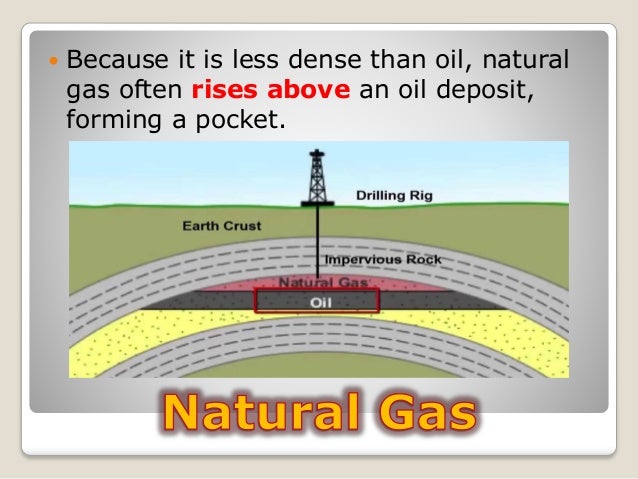Natural Gas
Occurrence-
Natural gas is found along with petroleum in reservoirs under the ground.
Composition-
It is chiefly made up of methane, though butane and propane are also present in small proportions.
Advantages
1) It is a clean non-polluting fuel.
2) It can be easily transported through pipes.
3) It can be pressed and stored under high pressure as
compressed natural gas (CNG).
Uses
1) CNG is used for power generation.
2) In some parts of India, e.g. Vadodara, CNG is supplied to homes
and factories through pipes and directly used as a fuel.
3) CNG is also now being used as a non-polluting fuel for vehicles.
4) Natural gas is used as a starting material for the manufacture of
chemicals and fertilizers.
Natural gas is a fossil fuel found naturally as a hydrocarbon gas mixture in the oil wells. Its main component is methane but it may also contain varying amounts of other higher alkanes (a group of elements). Gases like carbon dioxide, helium, nitrogen, and hydrogen sulphide are also found in natural gas in small percentages.
Why is Natural Gas important as a fossil fuel?
· Natural gas is considered important as this fossil fuel can easily be transported through pipes.
· It is stored as CNG which is used for several purposes and is also used as a starting material for manufacturing many chemicals and fertilisers.
· Natural Gas does not cause pollution and has high calorific value. Compressed Natural Gas (CNG) is the natural gas stored under high pressure.
Why is CNG useful? CNG is used as:
· Fuel to generate power
· Cleaner fuel for transport vehicles (less polluting than petrol and diesel)
· Fuel in homes and industries which can be supplied through pipes.
· CNG pipeline network already exists in Vadodara in Gujarat, some parts of Delhi and some other places.
Why is CNG considered as a cleaner fuel?
· Natural gas is considered a better fuel than coal and petroleum because it is cleaner.
· This means that it results in less amount of pollution that the other fossil fuels.
· Natural gas emits 50% less carbon dioxide, sulphur and nitrogen oxides in the air.
· However, it is not the best solution as there are better sources of energy present nowadays like solar energy.
In India, vast reserves of natural gas are found in: Maharashtra, Rajasthan, Tripura, and River Delta of Krishna and Godavari.
Some Natural Resources are Limited
Fossil fuels, such as coal, petroleum, and natural gas cannot be created in the laboratory as it is not possible to create the natural conditions under which they are formed. Moreover, it takes thousands of years for them to be formed.
Consequences of the burning of fossil fuels
1. Increase in air pollution: The burning of fossil fuels results in the release of unburnt carbon particles in the air. These particles act as pollutants and increase
air pollution. Fossil fuels release poisonous gases such as carbon monoxide and sulphur dioxide in the atmosphere.
2. Global Warming: Fossil fuels when burnt release large amounts of carbon dioxide in the air. As the amount of carbon dioxide increases it results in an increase in the global temperature of the earth and leads to global warming.
Why should we use fossil fuels economically?
1. They are available in limited quantities.
2. Burning these fuels also cause air pollution as well as global warming.
Hence, we should use these fuels economically to make sure that we can use them for a longer time, the risk of global warming gets reduced, and we can live in a cleaner environment.
How can we save petrol or diesel while driving?
According to the Petroleum Conservation Research Association (PCRA) in India, we can save petrol or diesel while driving by:
1. Drive at a constant and moderate speed.
2. Maintain tyre pressure at correct levels.
3. Switch off the engine when you are waiting( such as traffic light).
4. Do regular maintenance of your vehicle.
Why fossil fuels can last for 100 years only?
· Fossil fuels are exhaustible resources which mean that they are not present in abundant quantities on the earth.
· They take hundreds and thousands of years to replenish.
· The rate at which they are being consumed today is increasing at a rapid pace.
· It means that more amounts of fossil fuels are being used than it is being replenished.
· Hence, scientists claim that they can replenish completely in 100 years.


No comments:
Post a Comment
If you have any doubts, Please let me know.